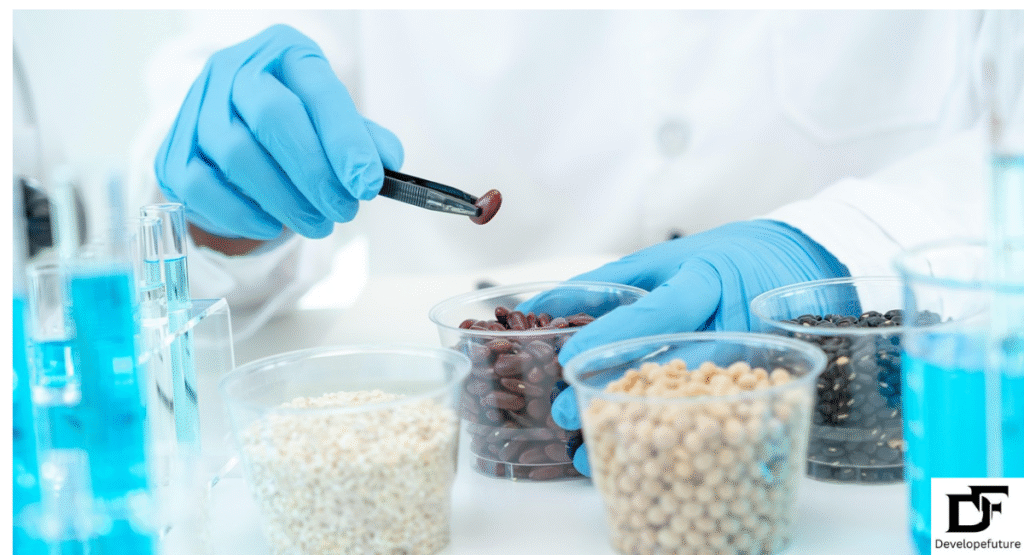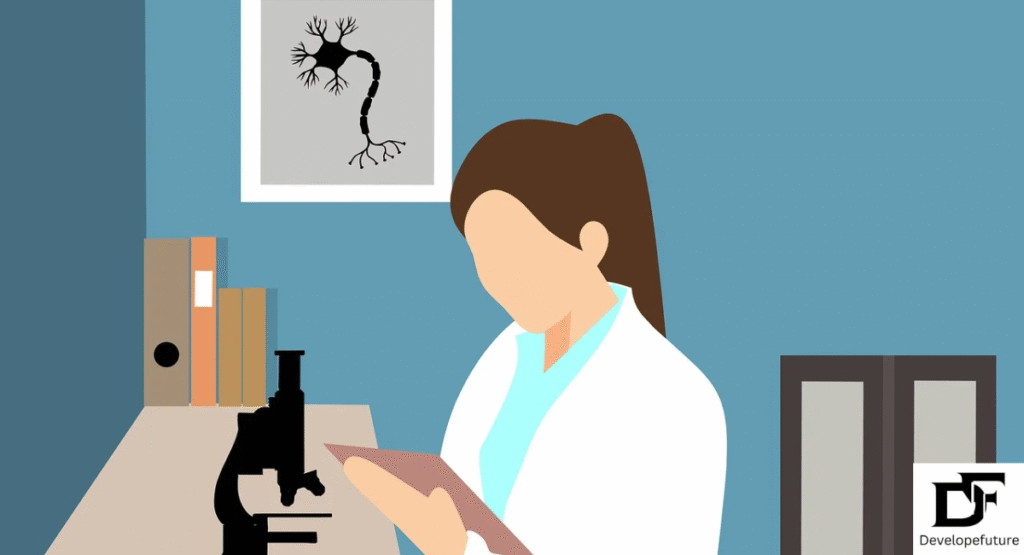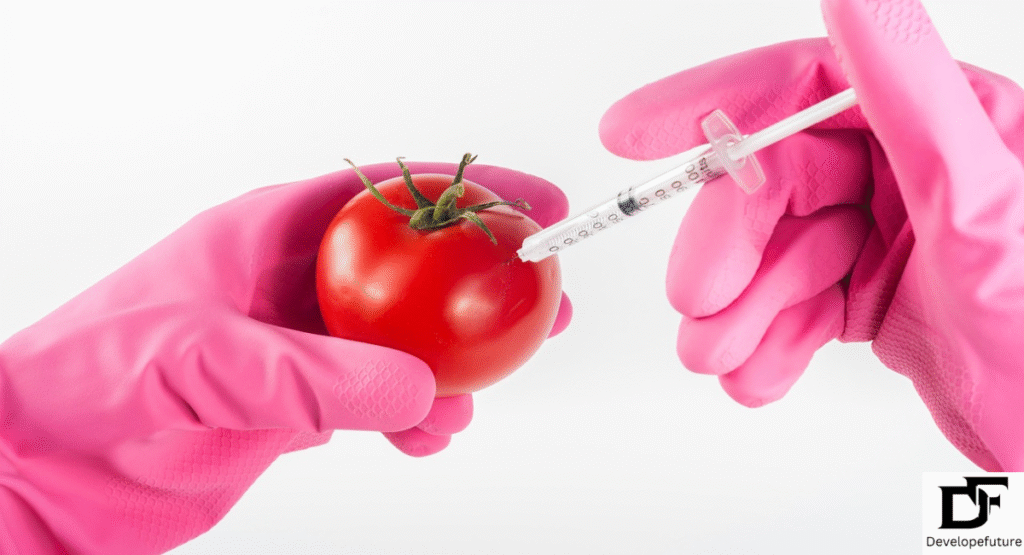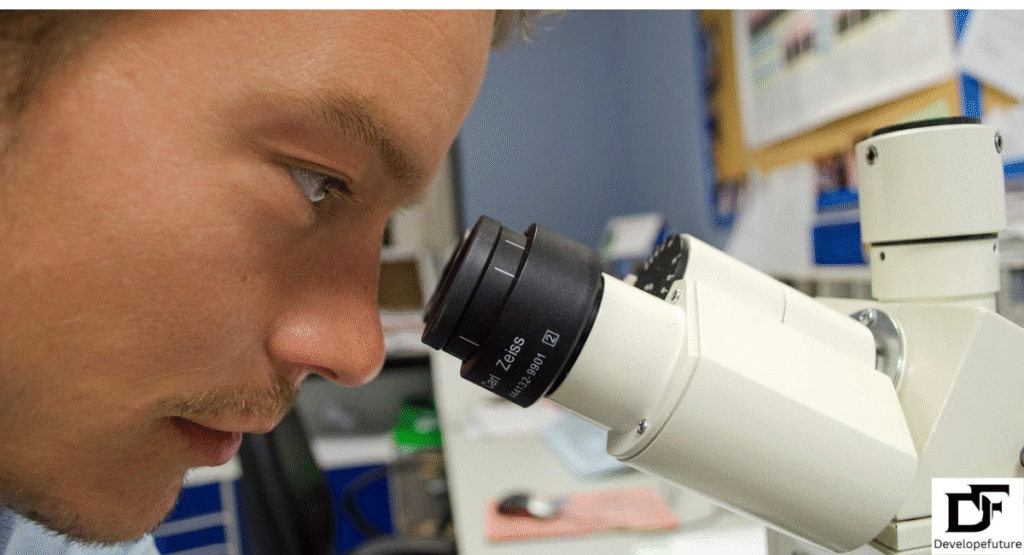Biotechnology, in simple words, is the science of using living things like cells, bacteria, and plants. I create valuable products, from developing medicines to enhancing food. This field is changing the way we live and solve real-world problems. It brings together biology and technology to help both people and the planet.
These days, this science plays a significant role in healthcare. It gives benefits in agriculture and even the environment. It allows scientists to create vaccines. It can grow better crops and clean up pollution using natural organisms. In simple terms, it means using nature in innovative ways to improve life.
In simple terms, biotechnology is the bridge between nature and innovation. It helps us explore how living organisms can be used to create tools, products, and solutions that improve our daily lives. Whether it’s saving lives or making food more nutritious, this powerful technology is shaping modern science.
Table of Contents
Understanding Biotechnology in Simple Words
Biotechnology, in simple words, is the use of living organisms. It is a system designed to create products that benefit people. It often involves altering tiny parts of life, such as genes, to create something useful. Scientists utilize this technology in various applications, including medicine, agriculture, and environmental protection.
Biotechnology, in simple words, also means using knowledge of biology to solve human problems. For example, scientists can genetically engineer bacteria to produce insulin for people with diabetes. This approach gives us tools to treat the disease. It grows more food and protects nature using the power of life itself.
In simple words, biotechnology is not just a science—it’s a solution. It takes what we know about living things and turns that knowledge into tools that benefit society. Whether it’s crops that survive harsh weather or eco-friendly products, this field is making our world better every day.

Types of Biotechnology
There are several types of biotechnology, each with a unique purpose and field of use. These include red (healthcare), green (agriculture), white (industry), and blue (marine). Each type plays a distinct role in enhancing various aspects of life.
Red biotechnology focuses on the fields of medicine and health. It involves making vaccines, gene therapies, and treatments for diseases. Green applications improve farming by creating pest-resistant or climate-adapted crops. White biotechnology helps industries make products. Like biofuels, blue biotechnology explores ocean life for innovation.
Understanding the types of this science in simple terms reveals the breadth and utility of the field. Whether it’s a medicine that saves lives or a cleaner fuel that protects the environment, each type brings a different benefit to society.
Importance of its in Everyday Life
This science touches many parts of our daily lives, even if we don’t always notice it. It helps produce healthier foods and develop life. It saves drugs and creates materials that are better for the environment. Many everyday products, like yogurt or bio-based plastics, are made using living systems.
One key benefit of this technology is in the healthcare sector. Medicines, vaccines, and treatments for conditions like cancer and diabetes are all developed through these advanced methods. Scientists use cells or organisms to produce drugs safely and effectively.
In agriculture, this field enables farmers to produce more food with fewer chemicals. Crops can be designed to resist pests, diseases, or drought. This makes food more accessible and affordable for people worldwide.

How it Helps the Environment
This field plays a crucial role in protecting the natural environment. Scientists use microbes to clean polluted soil, treat waste, and even reduce harmful gases in the air. This is known as environmental biotechnology, and it’s helping build a greener planet.
In farming, it reduces the need for chemical fertilizers and pesticides. Genetically improved crops naturally resist pests, reducing pollution and maintaining healthy soil. This results in more eco-friendly and sustainable farming practices.
Biotechnology, in simple words, helps balance human needs with the planet’s health. It provides us with more innovative ways to grow food, clean up messes, and utilize resources without harm. That’s why it’s such a vital part of a better future.
Real-Life Examples of it
This science is all around us, often in ways we don’t even realize. For example, COVID-19 vaccines were created using highly advanced biotechnological tools. These methods helped scientists respond faster than ever before.
In food production, microbes play a crucial role in creating products such as cheese, yogurt, and bread. Some foods are genetically enhanced to stay fresh longer or contain more nutrients. This makes better nutrition more accessible to a broader range of people.
In simple words, this field brings science into our homes, hospitals, and grocery stores. It helps make our lives healthier, safer, and more efficient with natural and innovative solutions.

Role in Agriculture
This technology is transforming how we farm by helping crops grow stronger and healthier. Scientists can now create plants. They resist insects, diseases, or harsh weather, improving food security for millions.
Farmers enjoy higher yields and more reliable harvests. Traits such as drought resistance and rapid growth are introduced through safe and tested methods. This makes agriculture more efficient and sustainable.
In simple words, biotechnology helps feed the world. With smarter seeds and improved tools, it offers genuine hope for reducing hunger and supporting global agriculture.
Role in Medicine
Biotech-based medicine has led to some of the most important breakthroughs in health. It enables the development of vaccines, therapies, and gene editing to treat diseases at their root cause.
It also supports personalized medicine, where treatment is based on a person’s unique genetic makeup. Tools like DNA testing help doctors choose better options for each patient.
This science is changing how we heal. It provides new ways to diagnose, treat, and sometimes cure once untreatable conditions.

Role in Industry
The industrial application of this technology is known as white biotechnology. Helping to reduce waste and pollution. Companies now use natural organisms to produce biofuels, bioplastics, and cleaner chemicals.
By replacing harmful industrial processes with green alternatives. This science lowers energy use and protects ecosystems. It’s a powerful part of the shift to sustainable business.
In simple words, biotechnology is making industry more eco-conscious. It’s helping us build cleaner factories, safer products, and a better planet.
Challenges and Ethics in Biotechnology
Although it is useful, this science raises significant ethical and safety concerns. Some people worry about the long-term effects of modified organisms or changing human genes.
To ensure safety, experts follow strict ethical guidelines and testing procedures. Open discussion and careful regulation are essential to ensuring the field benefits everyone.
In simple words, biotechnology must be used wisely. With thoughtful choices and responsible science, we can enjoy the benefits while avoiding the risks.
FAQs
What is biotechnology in simple words?
It’s the use of living things to make products and solve problems in health, farming, and industry.
How is biotechnology used in daily life?
It helps produce medicine, grow food, and create items such as biofuels and bioplastics.
What are the main types of biotechnology?
Red (health), green (agriculture), white (industry), and blue (marine).
Is biotechnology safe for the environment?
Yes, when used carefully, it helps reduce pollution and improve sustainability.
Why is biotechnology important?
It improves lives by solving real-world problems through the combined use of biology and technology.
Conclusion
Biotechnology, in simple words, is using living organisms to solve problems and improve life. It influences our health, food, environment, and more in powerful but often invisible ways. From vaccines to farming, this field helps improve lives worldwide.
Looking ahead, this science promises even more breakthroughs. It will help cure diseases, grow more food, and protect the earth by using nature’s tools. That’s the power of biotechnology in simple words—a mix of biology and visionary innovation.

